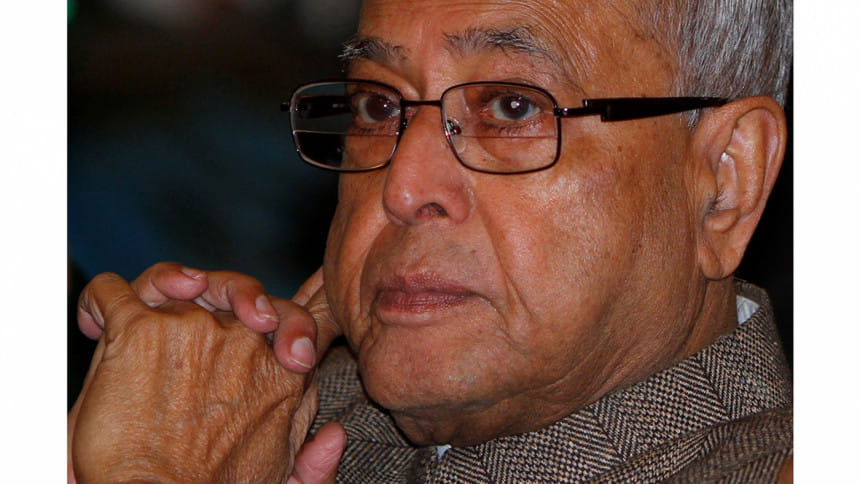Pranab Mukherjee: A Mentor for Mass Leaders

A major disappointment in the public life of India's first Bengali President Pranab Mukherjee, who died on August 31, 2020, was that he could never contest and win direct elections to parliament, which would have helped him shed the tag his critics gave him: "a politician without a mass base and following." He won his first and only Lok Sabha poll in 2004 from the Jangipur constituency in West Bengal and that too with covert help from the state's then ruling CPI(M) whose top leadership, including late Chief Minister Jyoti Basu, had a strong rapport with Mukherjee.
Mukherjee's stint as a lawmaker mostly consisted of his membership of Rajya Sabha, whose electors, unlike that of the Lok Sabha, are not the people. But Mukherjee's success as a politician makes him a rare example of a person whose steady rise never depended on mass politics. He was always a key backroom strategist and the chief trouble-shooter of the Congress, riding on the back of his photographic memory and thorough knowledge of history, the Constitution, and the rules of administration. Indira Gandhi got a glimpse of these qualities in Mukherjee when she spotted him at a public rally in Medinipur in 1969 and wanted him to be drafted into the Congress. His preoccupation with national politics and parliamentary system and governance hardly allowed him to devote his time to the rough and tumble of grassroots politics.
Mukherjee was a mentor for politicians with mass base. These qualities have always ensured that Mukherjee—or "Poltu Da" to a coterie of Congressmen—remained at the centre of attention and action during the decade-long rule of Congress-led United Progressive Alliance (UPA) since 2004, heading an unprecedented number of committees dealing with various key issues facing the country. Every time the Congress or the Congress-led UPA government faced a crisis triggered by the quicksand of coalition politics in India, Mukherjee had to play the role of a crisis manager. Yet, he remained the "best" prime minister India never had, mainly due to the trust deficit with the Gandhi family. It was this deficit that saw him being ignored for the top job thrice—first after Indira Gandhi's assassination in 1984, second when Sonia Gandhi declined to become PM in 2004, and then again in 2009 when Manmohan Singh was the undisputed choice of Sonia to head the Indian government.
Though handpicked by Indira Gandhi to enter the Congress, the seeds of cold vibes between Mukherjee and the Gandhi family emerged when the Congress was forced to choose a successor to Indira in October 1984. Indira's son Rajiv Gandhi not only became the PM but he saw to it that Mukherjee was shunted out of the Congress Working Committee, the party's top decision-making forum, the Congress Parliamentary Board, and finally out of the party in 1986. The political grapevine has it that Rajiv was convinced by some of his Doon School friends like Arun Nehru about Mukherjee's prime ministerial ambitions and that he could pose a leadership threat.
But Mukherjee was too important to be kept out of the Congress for long. He returned to the party six years later and once again proved his mettle as a reliable Sherpa for the Gandhi family after Sonia emerged from a long-secluded life following Rajiv's assassination, plunged into politics, and made her debut in parliament in 1999. The Congress could not do without Mukherjee's help as a political manager par excellence, having excellent networking across the political spectrum and the business world.
Mukherjee served the Gandhi family for three generations from Indira to Sonia. But the family decided to ignore him when the crunch time came to make him India's first Bengali PM. Ironically, it was Mukherjee whose ingenious interpretation of a clause in the Congress Party's constitution helped Sonia Gandhi pip her nearest challenger Sitaram Kesri in the race for the post of party president in 1998—a journey that ended with Rajiv's wife becoming the longest-serving chief of the Congress till 2017.
There was always an undercurrent of unease between Mukherjee and the Gandhi clan in the years after Indira's assassination, and it never went away. In fact, that unease almost prevented Mukherjee from missing out on moving into the Rashtrapati Bhavan as Sonia was not willing to spare his services as a strategist of the Congress. But Mukherjee's brilliant political acumen, particularly his wide acceptability among all opposition parties, saw the Samajwadi Party and Mamata Banerjee-led Trinamool Congress change their stand on supporting him, forcing Sonia's hand on backing him as the consensus presidential choice in July 2012.
Mukherjee had grabbed with both hands the opportunity of working with Indira Gandhi as her trusted lieutenant. Indira shaped his evolution into an enlightened and accomplished modern backroom politician. He not only became the Indira government's finance minister but also the second man in her cabinet, ahead of veterans like P.V. Narasimha Rao and R. Venkataraman who went on to become India's prime minister and president respectively. Mukherjee did not stop at that. He reinvented himself as a man for all seasons as far as the Congress was concerned. With his sharp mind and vast knowledge, he emerged as an eloquent parliamentarian with exemplary poise and absolute familiarity with the nitty-gritty of the functioning of the government, parliament and India's political system. His strong grasp of intricate power politics within the Congress helped him create an aura of indispensability in the party.
Bangladesh always held a special place in his heart not just because his wife Suvra Mukherjee was from the Bhadrabila village in Narail, but also because of the close bond his family built and nurtured with Prime Minister Sheikh Hasina and her sister Sheikh Rehana and their children. During the darkest phase of Hasina's life after the brutal assassination of her family on August 15, 1975, Mukherjee and his wife were guardian angels to them in New Delhi where the two sisters had taken asylum. Mukherjee's close relations with Jyoti Basu, developed during the latter's stint as West Bengal's deputy chief minister in a coalition in late 1960s, helped work out the Ganges water-sharing treaty with Bangladesh in 1996.
Mukherjee had been the quintessential Congressman till the last day of his life being on the left-of-centre ideological trajectory of the party. He was a strident critic of communalism, a stand he never deviated from. But that did not prevent him from pursuing what he thought was an inclusive political philosophy that includes all shades of opinion not only within the Congress but also in national politics in a diverse country like India. It was pragmatism so typical of Mukherjee, pragmatism that was born out of his association with Ajoy Mukherjee, the first non-Congress chief minister of West Bengal, under the aegis of Bangla Congress, a breakaway group of the Congress. Breakaway Congress leaders Ajoy Mukherjee and Jyoti Basu were part of the same government.
It is in this light that one needs to see Pranab Mukherjee's controversial visit to the RSS headquarters after his departure from the Rashtrapati Bhavan. The visit had split the Congress down the middle but Mukherjee stuck to his gun and just recalled how Jyoti Basu, Vishwanath Pratap Singh and Atal Bihari Vajpayee had shared the dais at a rally in Kolkata in June 1988, driving home the point that the Bharatiya Janata Party (BJP) was no longer politically untouchable.
Pranab Mukherjee belongs to a vanishing tribe of politicians who live their life on their own terms when it comes to matters of conviction, never hesitating to do blunt-talking both within the party or government and reminding the RSS in its den about the need for rising above a monolithic worldview and acknowledging the religious, ethnic and linguistic plurality of India.
Pallab Bhattacharya is a special correspondent of The Daily Star. He writes from New Delhi, India.

 For all latest news, follow The Daily Star's Google News channel.
For all latest news, follow The Daily Star's Google News channel. 



Comments